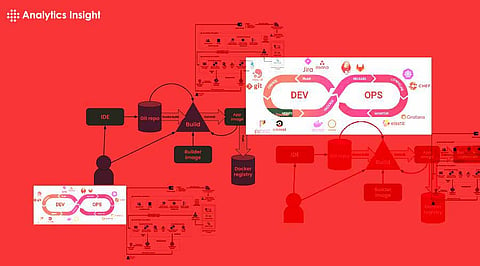

The integration of Machine Learning Operations (MLOps) in the cloud has revolutionized how organizations manage, deploy, and monitor machine learning models. MLOps, the practice of applying DevOps principles to machine learning workflows, emphasizes the need for automation, scalability, and continuous integration and deployment (CI/CD) in ML projects. Cloud-based MLOps platforms offer robust solutions to address these needs, making it easier for data scientists and engineers to manage the end-to-end lifecycle of machine learning models. Here’s a look at some of the top cloud-based MLOps platforms and solutions available in 2024.
Amazon SageMaker is a comprehensive cloud-based machine learning platform from AWS that simplifies the development, training, and deployment of ML models. It provides a range of tools for building, training, and deploying models quickly and at scale.
Managed Jupyter Notebooks: Simplifies the process of data exploration and model development.
AutoML Capabilities: Automatically selects the best algorithms and hyperparameters for your models.
Model Deployment: Offers one-click deployment and monitoring with real-time and batch predictions.
Integration with AWS Ecosystem: Seamlessly integrates with other AWS services like S3 for data storage and Lambda for serverless computing.
Provides a fully managed environment, reducing the operational overhead of maintaining ML infrastructure.
Scales easily with AWS's robust cloud infrastructure, supporting both small and large-scale ML projects.
Google Cloud AI Platform offers a suite of tools for managing the complete ML lifecycle, from data preparation to model deployment and monitoring. It’s designed to help organizations build scalable and reliable ML solutions.
Vertex AI: Unified interface for managing ML workflows, including data labeling, training, and deployment.
AutoML: Enables users to build custom models without extensive machine learning expertise.
Model Monitoring and Management: Provides tools for tracking model performance and managing model versions.
Integration with Google Cloud Services: Connects with other Google Cloud services like BigQuery for data analytics and Dataflow for data processing.
Leverages Google’s powerful infrastructure and AI capabilities to provide high-performance and scalable ML solutions.
Offers advanced tools for model training and optimization, making it suitable for complex ML tasks.
Microsoft Azure Machine Learning: is a cloud-based MLOps platform that provides a range of tools and services for building, training, and deploying machine learning models. It emphasizes integration, automation, and collaboration across ML teams.
Azure ML Studio: An intuitive environment for building and training ML models with drag-and-drop capabilities.
Automated ML: Automates the process of model selection and hyperparameter tuning.
MLOps Integration: Supports CI/CD pipelines for ML models, enabling continuous integration and deployment.
Model Monitoring and Governance: Tools for monitoring model performance and ensuring compliance with regulatory standards.
Integrates seamlessly with other Microsoft services like Azure DevOps and Power BI, enhancing the overall data and analytics ecosystem.
Provides robust tools for collaboration and managing ML workflows across teams.
IBM Watson Studio offers a suite of tools for data scientists, application developers, and subject matter experts to collaboratively work on machine learning projects. It’s designed to support the entire ML lifecycle from data preparation to deployment.
AutoAI: Automates the process of data preprocessing, model building, and hyperparameter tuning.
Model Deployment and Monitoring: Provides capabilities for deploying models to various environments and monitoring their performance.
Integration with IBM Cloud: Leverages IBM’s cloud infrastructure for scalable and secure ML operations.
Collaborative Tools: Facilitates collaboration among data scientists and developers through integrated workspaces.
Offers a robust suite of tools for both novice and experienced data scientists, making it suitable for diverse ML projects.
Provides strong support for model governance and compliance, which is crucial for enterprise applications.
DataRobot is an enterprise AI platform that provides automated machine learning and MLOps capabilities to help organizations deploy and manage ML models efficiently. It focuses on simplifying the ML lifecycle through automation and integration.
Automated Machine Learning: Automates the end-to-end process of model building, from data preparation to deployment.
Model Deployment and Management: Offers tools for deploying models into production environments and managing their lifecycle.
Explainable AI: Provides insights into model decisions and predictions, enhancing transparency and trust.
Integration with Enterprise Systems: Connects with various enterprise data sources and applications for seamless integration.
Simplifies complex ML processes through automation, making it accessible for organizations with limited ML expertise.
Enhances model governance and transparency, which is important for enterprise and regulated industries.
Kubeflow is an open-source platform designed for running ML workloads on Kubernetes. It provides a set of tools for managing machine learning models and workflows in a cloud-native environment.
Kubernetes Integration: Leverages Kubernetes for scalable and efficient ML operations.
Pipeline Management: Provides tools for creating, managing, and automating ML pipelines.
Model Serving: Supports serving models in production with tools like KFServing.
Customizable: Highly configurable to meet the specific needs of different ML workflows.
Ideal for organizations already using Kubernetes or looking to build a cloud-native ML infrastructure.
Offers flexibility and scalability, suitable for both small and large-scale ML deployments.
